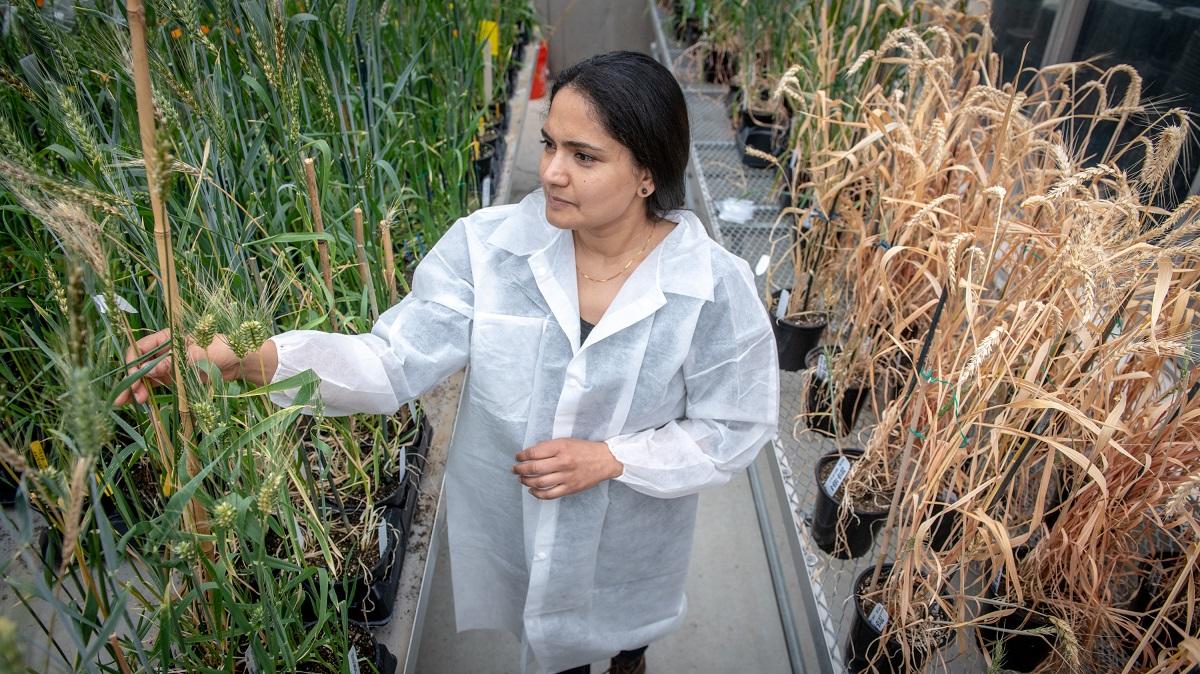New grant will support research, education, and Extension efforts to benefit farmers and train future scientists
Image Credit: Edwin Remsberg
Nidhi Rawat, assistant professor in Plant Science and Landscape Architecture at the University of Maryland, recently received the National Science Foundation’s (NSF) prestigious Career Award in Biological Sciences. This five-year award of $500K continues and expands Rawat’s primary work to investigate the genetic mechanism of plants that are resistant to fungal pathogens like Fusarium graminearum, the cause of Fusarium Head Blight or wheat scab, a major global crop disease and a significant concern in the state of Maryland for the success of crops like wheat and barley. Understanding how resistant plants stop the growth of fungal pathogens like this at a cellular level will allow this information to be applied genetically to future crop varieties to ultimately improve the resistance and survivability of crops, helping to create a more sustainable food supply.

“Fusarium Head Blight is not only a Maryland problem, it is a problem everywhere wheat is grown around the world,” says Rawat. “And the fungicides are losing their efficacy because the disease is evolving at such a fast rate, so with warmer and wetter climates it is only increasing in intensity. My work ranges from the subcellular level all the way to the field level and what impacts we can have on farmers, and this grant will help advance that work.”
According to Rawat, the molecular mechanisms of resistance against fungal pathogens like those that cause Fusarium Health Blight are not well understood, so a heavy focus of this grant award involves unraveling those mechanisms. “We will be working a lot on what happens in resistant versus susceptible plants, what are the genetic differences, and can those findings be translated into plant systems that farmers can use,” says Rawat. “We also hope we can go beyond Fusarium graminearum and apply this work to other pathogens and crop diseases.”

This award is especially relevant to Maryland, as it is one of the worst states affected by Fusarium Head Blight in the United states, according to Rawat. “Whenever wheat is flowering in Maryland, we always have a wet season, and this fungus attacks only when wheat is flowering and likes the wet conditions for its proliferation,” explains Rawat. “It’s a recipe for disaster, and it’s not just restricted to wheat. It infects other small grain crops as well. Malting barley, for example, has a lot of future and interest in Maryland for local beer production, but this disease is holding it back because of the mycotoxins associated with Fusarium Head Blight.”
In addition to prioritizing research, Rawat’s new grant includes the education of the next generation of scientists and the dissemination of findings out to farmers and the community through Rawat’s joint appointment with UMD Extension. As a part of that mission, this Career Award includes plans for a new summer internship program for minority students from Eleanor Roosevelt High School in Greenbelt, Maryland, giving them an opportunity to spend six weeks in the lab learning about plant science and encouraging them to pursue advanced degrees in STEM.
“My position is a unique opportunity to teach and extend knowledge, focusing on not just my research, but how I can translate what I do in my lab to ultimately benefit farmers and future leaders in plant science.”
This Career Award grant was awarded by the National Science Foundation (NSF), Award #1943155.